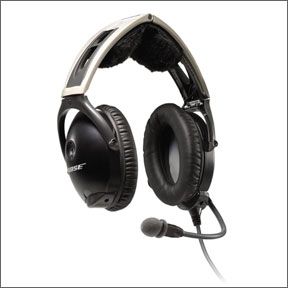As recently as 10 or so years ago, the idea of an aviation headset incorporating active circuitry reducing cockpit noise wasnt commonplace. Earlier, cockpits had become extremely busy, and reaching for a microphone every time ATC called proved to be a major distraction. Finally gone were the days when pilots and crews strained to hear the radio and each other, evoking memories of the takeoff scene from the movie
Headsets have become such a common-place item that we tend to take them for
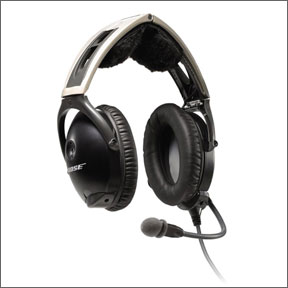
288
granted-we dont often pause to think much about the broader implications of an inferior headset. Having recently had the pleasure to test headsets in a laboratory for sister publication
Aviation Consumer, I came away with a new-found appreciation for the fssafety benefits a good headset can provide.Hearing Loss
Perhaps the most often considered second order implication is hearing loss. Personally, Im a poster child for how to abuse your ears. As a teenager, I had this monster stereo in my room. Of course, my parents wouldnt let me enjoy my music at what I considered moderate levels, so I got headphones for the stereo. Then I cranked it up. All the way up. For hours. Oh, Im also a motorcyclist. I also shoot guns and, of course, Im a pilot. I know Im not alone, too. In fact, I think I see a few hands going up and a few heads nodding in the room.
Yep, Im the poster child for hearing loss through abuse. Its not really that bad-I have my good ear and then on the other side of my head Ive got this thing that helps hold up my glasses. Many years ago I found myself turning my head so that my “good” ear was toward the sounds I was having trouble hearing. Any more hands going up?
Okay, so weve got to protect our hearing. If we dont, well at least lose some of it, and thats not a good thing. Headsets protect our hearing. This, however, isnt nearly as simple as it seems. Traditional passive circumaural headsets (headsets fitting against the head, surrounding the ear) protect best against high-frequencies. They do this through the clamping of the seal against your head. This requires enough physical pressure that these types of headsets have gained a well deserved reputation as being “vise-like” and uncomfortable
Headsets with active noise reduction have become popular because they seem to do a better job and are more comfortable. They dont clamp as hard. However, most of the better ones do still achieve a reasonably good seal against your head, but, to be sure, not as good as the better passive headsets. To make up for the less effective ear seal, they rely on electronic gadgetry to actually remove the
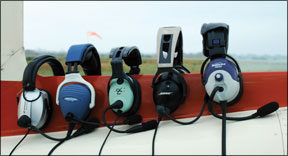
288
noise that gets past the ear seals.
But, theres a big difference. An effective ear seal is best at blocking high frequencies. Electronic noise reduction is best at cancelling low frequencies. So, obviously, theres more to consider here than the amount of noise reduction. This is where it gets interesting.
Take two different noisy environments: One is noisy primarily with high frequency sound and the other with low frequency sound. Assume the absolute level of each is the same. Its an interesting feature of the combination of how our ears work and how our brains process that information from our ears, that the room with the lower frequencies will seem more physically bothersome to us. In the room with the higher frequency noise, however, well have more trouble understanding each other.
Prolonged exposure to low frequency noise is fatiguing. It wears on us. However, prolonged exposure to any loud noise will, over time, damage our hearing. Of course, the high frequency noise will make it difficult for us to detect the nuances in communications, such as the spoken difference between “five” and “nine” when spoken quickly and casually. This is true for two reasons. First, even if your hearing is good, the high frequency noise tends to mask that difference. Second, high frequency hearing loss diminishes our ability to tell the difference, even in a quiet environment.
The engine-prop combination in piston planes produces an abundance of low-frequency sound. Yet, the motion of the plane through the air and the air leaking into the plane all conspire to create a cacophony of high-frequency noise. So, what should you do? Our own testing, and the markets reaction in general, clearly tell us that active headsets do a better job overall. The total perceived noise reaching our conscious thinking is lower with a quality active headset. Want to protect your hearing? Want to hear better? Get a good ANR headset.
Fatigue
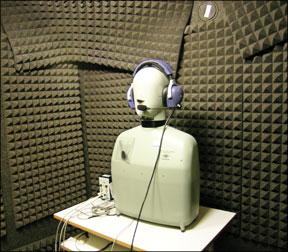
288
Take two people, equally rested. Put them in different noise chambers. One chamber is quiet and the other is noisy. Wait a few hours. Then, test their performance on standard alertness and coordination tests. Most of us would readily predict that the person in the quiet chamber would perform better every time. Although theres little definitive research on the topic, evidence clearly suggests that noise makes us tired more quickly than silence.
Fatigue comes from many sources and can be insidiously dangerous. As humans we become fatigued with prolonged concentration. Ever hand fly a couple hour leg in actual IMC? Its pretty tiring. If youve got a couple long legs to fly, youre going to be very fatigued indeed. Add lower oxygen pressure at altitude, or even the elevated cabin altitude in a pressurized cabin, youre going to be more fatigued. Now, subject yourself to an unpleasant amount of noise for those many hours, and youre going to be more fatigued yet.
Supplementary oxygen is the best defense against the altitude. We can try to control leg length, but the realities of modern life often dictate that we fly longer legs and/or more legs per day than we might like. We can also control noise exposure. Few owners make cabin noise levels even a factor in their aircraft purchase decisions. That means youve got to do everything you can to mitigate the fatiguing effects of that noise. Get a good noise cancelling headset!
Intelligibility
The role of communication in the successful outcome of a typical flight today has never been bigger. Sure, we can still fly all the way across the country without even having a radio, but thats hardly the way its done any more. Even when not flying IFR, most pilots use VFR Flight Following. It just makes sense to have one more set of eyes looking out for us.
Then, of course, weve got to take off and land. Even if we use non-towered airports, theres still other traffic around. Good radio procedures, listening for, and understanding the other traffic, are all part of most flights.
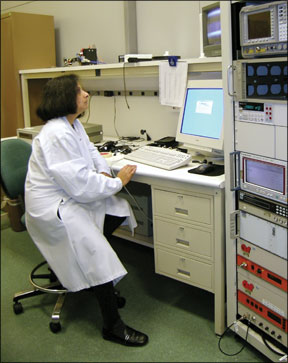
288
Perhaps its obvious, but weve just got to be able to hear whats coming over the radio. Its also nice to be able to hear the other folks flying with you. If youre one member of a flight crew, that need advances from nice to critical.
I fly a lot in a crew environment. We have a Standard Operating Procedure that dictates to a rather precise degree our roles, duties and what we say and when to say it. With this level of repeatability and predictability, youd think that required crew communications would be simple. Nonetheless, Ive occasionally flown with other crew members whose headsets were not quite up to the task. These were good headsets from major manufacturers, but they were unsuited to our environment. Id call for gear down, for instance, and the other guy just sat there. We depend on the drag from the gear to aid in speed control and configuration management. Without the gear, we might very well find ourselves getting behind on the approach until we notice. Not good.
This example, by the way, is real. Ive had it happen to me. I was the captain and pilot-flying, and repeated lack of clear communication with my first officer throughout that flight was a real problem. We chatted about it after the flight. The pilot confessed to me that he really couldnt hear me that well with his headset, apologized for missing a lot of things (not just that one gear command) and said hed listen more carefully.
Then there is the whole problem of miscommunication. If we miss a radio call because we didnt hear the call sign accurately, or, worse, we take the wrong call, get the altitude or heading wrong, things can get dangerous in a hurry.
Our hearing also enters into this idea of intelligibility. Are you getting older? Past 40? More and more of us are. Just like our eyes tend to get “stiffer” as we age, limiting our ability to focus close enough to read, with age it also becomes gradually more difficult to hear the high frequencies. Any more hands going up?
So, with a little damage from excessive noise and a limitation from age, we simply cant hear the higher frequencies as well, and this can reduce our ability to hear the difference between certain sounds.
Most headsets have reasonably low distortion and acceptable frequency response. The best ones will help us hear better. After all, if our ears are not quite up to par to begin with, why exacerbate the problem by not even delivering the information accurately to our ears?
Get a Good Headset
Want to protect your hearing? You need a good headset. Want to arrive at your destination as sharp as possible, forestalling fatigue? You need a good headset. Want to hear the radio and your passengers or other crew members accurately? You need a good headset. Need to make up for hearing loss thats already making it sometimes difficult to hear clearly? You need a good headset.
Which one? Well, without naming names, most reviewers acknowledge the most expensive headsets do the best job. How much to spend? To paraphrase motorcyclists asked how much to spend on a helmet, “Whats your hearing worth? Whats reduced fatigue and better performance on that gnarly approach worth? Whats getting the radio calls right worth?”
Dont scrimp. Get the best headset you can justify. Its the safest thing to do.
Frank Bowlin flies CRJs for a large regional airline and is an in-dependent CFI in Watsonville, Calif.

